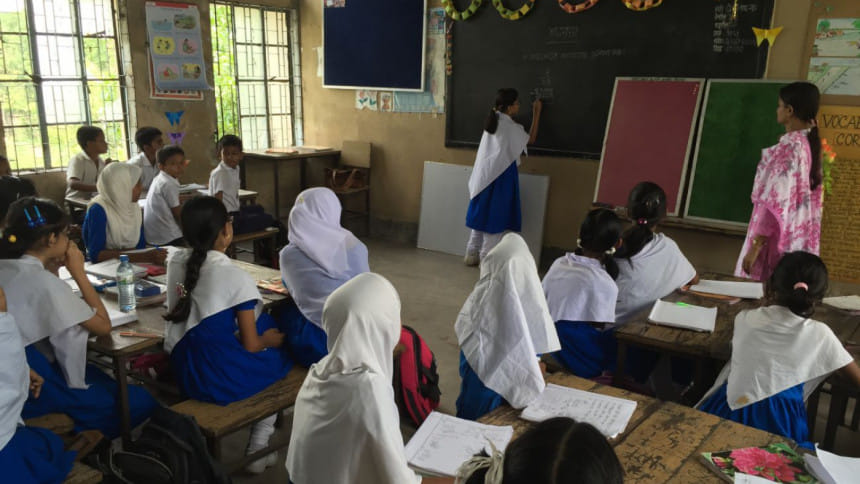Beyond ethics and values

A society devoid of moral and ethical values cannot continue as an effective society as society is built on reciprocal cooperation and mutual understanding of people. A roundtable discussion organised by The Daily Star and CAMPE in December 2017, was a timely initiative to draw the attention of the people about the importance of ethics and values as the driving force for an enlightened society.
But ethics and values are not the only panacea by which we will be able to meet changing learning demands for an increasingly complex world beset with highly complex and uncertain challenges like environmental degradation, economic crisis, poverty, food security, etc. There are other factors which need to be focused on along with ethics and values in education.
The report Learning: The Treasure Within published by Unesco (widely known as "Delors Report") emphasises on both the purposes for 21st-century education and the kind of outcomes of schooling that should be valued in education systems around the world. For example, what might we want our young people to 'be' as a result of their education? What will today's students need to be capable of doing and being in their lives beyond school?
Learning is not just about being capable now but being capable of continuing to learn across one's whole lifespan. It is much more than demonstrating appropriate behaviour in a tightly managed learning context. It means that today's students will need to be capable of encountering unseen problems in their lives beyond school. As for example, students learn science now so that they can become capable adult citizens when confronted with decisions in which some science knowledge will help them make an informed choice.
Shakespeare's Hamlet said, "There is nothing either good or bad, but thinking makes it so." So, thinking reflectively is at the heart of all other key competencies. We want our learners to think about the impact of personal and collective actions on others and the environment—local and more distant—and ultimately on the planet as a whole.
A recent report on food safety in The Daily Star has found that heavy metals like lead in food are a major concern for food safety. Disposal of used fuel oil, batteries and industrial waste may cause the contamination and be the source of heavy metals. So, food safety does not depend on the growers' choices only. The choices of other different organisations need to be counterbalanced by drawing attention to the wider systems, politics and associated regulations. So, our students need to learn the system's thinking capability which they will see from a holistic point of view.
Only content-based aspects of thinking are not enough to ensure food safety but system thinking relating to social and environmental dimensions is important to take on these issues. If we take the challenge of educating students for this century seriously, we must develop their system-thinking capabilities with a repertoire of skills and strategies for collaboration and for taking action to address issues that concern them and their communities.
Besides, we want our learners to think critically and creatively to tackle challenges they might face in future. We want learners who cultivate curiosity and a sense of wanting to know, and show resilience in the face of challenges and uncertainties.
Only paper-pencil test to assess the acquisition of content knowledge of students will not help us acquire the abovementioned capabilities. Learning will almost certainly encompass something more than traditional content acquisition. It is the rich mix of knowledge, skills, attitudes and values that educates the future builders our society will need. So, focus of our education system should be on developing key competencies for the future builders—something the world is recognising now.
This is why developed countries are giving utmost effort on effective classroom learning and development of teachers' capability instead of only assessing textbook information through summative paper-pencil examinations. Their objective is to make education a relevant tool for helping people to live a decent life in the world we live in, and, more importantly, enable us to shape the world we aspire to live in.
There is a study on "How the world's most improved systems keep getting better" in which Singapore was at the top of the list. The reason for the country being at the top is obvious because the National Institute of Education (NIE), an autonomous institute of Nanyang Technological University (NTU) in Singapore, says that they "prepare teachers with the requisite values, skills and knowledge to meet the demands of 21st-century learners and classrooms." It is unthinkable in developed countries to recruit a teacher without any professional teacher training certification as is the case with doctors or engineers. This certificate is renewable. It is not as if once you acquire a certificate to be a professional teacher, you can be a teacher forever. It is a pity that in our country we are not focusing on this type of recruitment.
When will we realise that quality education does not mean increased pass rate and a plethora of GPA-5's acquired through regurgitating traditional textbook information? Rather it is associated with new evolving knowledge and skills which are the key to societal and global productivity and personal and social wellbeing. Once we come to this realisation, maybe then we can get rid of question paper leaks which only indulge students in the rat race of achieving the so-called golden GPA-5.
In reality GPA-5 does not indicate students' true competencies necessary for today's competitive environment and for the future as focus is on content acquisition rather than 21st-century competencies. It is the right time for us to move away from an examination-focused assessment system and give emphasis on classroom learning with the help of capable teachers who can teach students to be self-aware, critical, aware of interconnections, empathetic, creative, curious and resilient—all the qualities necessary for life and work.
Robiul Kabir Chowdhury is Senior Specialist, Examination and Evaluation, Bangladesh Examination Development Unit, Board of Intermediate and Secondary Education, Dhaka.





Comments